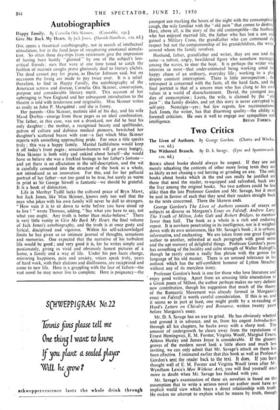Autobiographies
Happy Family. By Cornelia Otis Skinner. (Constable. iss.) Give Me Back My Heart. By Jack Jones. (Hamish Hamilton. i 2s. 6d.) ONE opens a theatrical autobiography, not in search of intellectual stimulation, but in the fond ,hope of recapturing emotional stimula- tion. So often these day-trips from retirement give the impression of having been hastily ghosted " by one of the subject's less- critical friends ; ears that were at one time tuned to catch the feeblest of matinee coughs prove gloriously deaf to literary clichés. The dead cannot pay for praise, as Doctor Johnson said, but on occasions the living are made to pay twice over. It is a relief, therefore, to find in Happy Family, the autobiography of the American actress and diseuse, Cornelia Otis Skinner, construction, purpose and considerable literary merit. This account of her upbringing in New England and her subsequent introduction to the theatre is told with tenderness and originality. Miss Skinner writes as easily as John P. Marmettid ; and she is funny.
Her parents—Otis Skinner, matinee idol of his day, and his wife Maud Durbin—emerge from these pages as an ideal combination. The father, in this case, was not a drunkard, nor did he beat his only daughter ; the mother, a recognised beauty and spellbinder, patron of culture and dubious medical pioneers, bewitched her daughter's scattered beaux with ease—a fact which Miss Skinner reports with something approaching pride. For once a title speaks truly ; this was a happy family. Marital faithfulness would keep it off today's front pages ; sensation-hunters will go away hungry. Miss Skinner is both witty and unkind about herself—she would have us believe she was a freckled hostage to her father's fortune— and yet there is no affectation in the self-description, and the wit is carefully cemented into the structure of the book as a whole, not introduced as an innovation. For this, and for her pellucid portrait of her father—not too good to be true, but surely as warm in print as Sir George Sitwell is fantastic—we should be grateful. It is a book of distinction.
Life in Merthyr Tydfil lacks the cultured peace of Bryn Mawr, but Jack Jones, like Miss. Skinner, knows only too well that the man who jokes with his own family will never be dull to strangers. " How vain it is to sit down to write before you have stood up to live ! " wrote Thoreau, adding, " Say what you have to say, not what you ought. Any truth is better than make-believe." There is very little vanity in Give Me Back My Heart. the final volume of Jack Jones's autobiography, and the truth is at once gusty and lyrical, disciplined and vigorous. Within his self-acknowledged limits he has given us an intimate journal of thoughts, sensations and memories. One expected that the narrative of his turbulent life would be good ; and very good it is, for he writes simply and passionately, giving us vivid and obviously honest pictures of a home, a family and a way of life. Under his pen faces change, mirroring happiness, pain and anxiety, voices speak truly, years of hard work, with their elations and disillusions, are recaptured and come to new life. Here is a grappling with the fear of failure—the vast novel he may never live to complete. Here is poignancy—the
youngest son marking the hours of the night with the consumptive cough, the wife familiar with the " old pain " that comes to destroy Here, above all, is the story of the old contemptible—the husban who has enjoyed married life, the father who has lost a son an gained a Military Cross, the grandfather who can command the respect but not the companionship of his grandchildren, the writer around whom the family revolves.
Husband, father, grandfather and writer, they are one and the same—a robust, angry, bewildered figure who somehow manage among the waves, to steer the boat. It is perhaps the writer wh interests us most—that under-estimated being working amid th happy chaos of an ordinary, everyday life ; working to a plan despite constant interruption. There is little introspection ; the retrospect is concerned with the facts, all the hard facts, and the final portrait is that of a sincere man who has clung to his own values in a world of disenchantment. David, the youngest son, dies of consumption ; Laura, the wife, is claimed by the " old pain " ; the family divides, and yet this story is never corrupted by self-pity. Nostalgia—yes ; but few regrets, few recriminations. Jack Jones, the writer, has that disarming quality—the ability to forestall criticism. He uses it well to engage our sympathies and


































 Previous page
Previous page